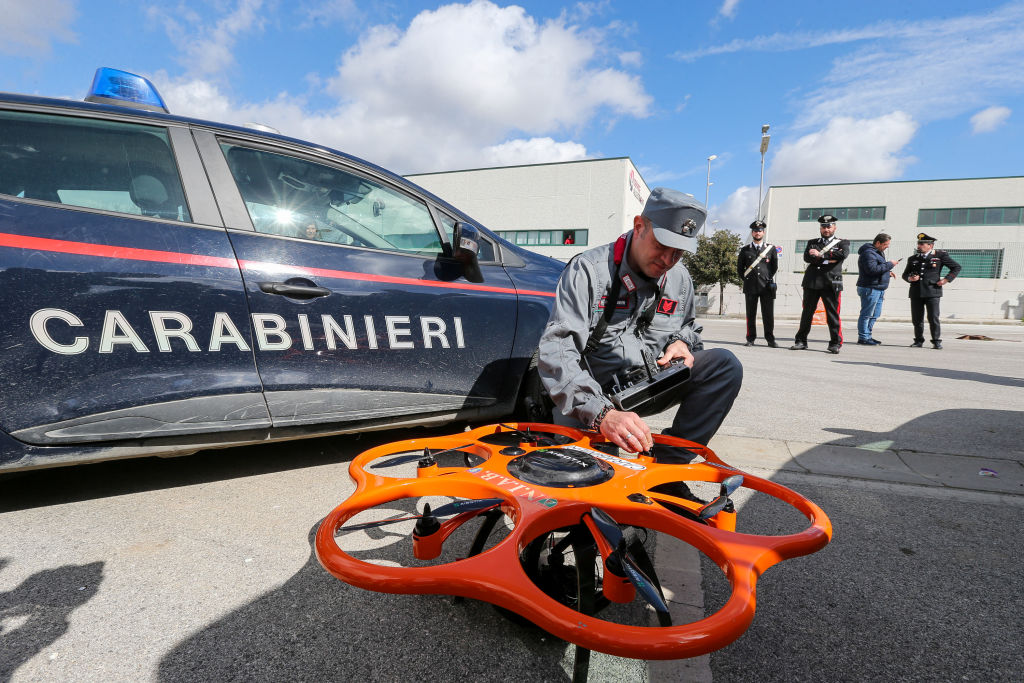
The beat
Italian police recover ancient treasure trove
Officers from a unit of the Italian Carabinieri have arrested 23 people involved in trafficking stolen archaeological artefacts. With support from police in the UK, Germany, France and Serbia, the unit recovered 10,000 artefacts that had been passed on to international auction houses by middlemen. Using drones, the police discovered that the gang used an excavator to carry out illegal archaeological digs in the southern region of Calabria.
Police right to inspect mobile phones clarified in Malaysia
Remarks made by Malaysia’s deputy home minister, Azis Jamman, sparked a debate over the right of police to inspect people’s mobile phones. Azis said the country’s police officers are legally authorised to check mobile phones to ensure they don’t contain obscene or offensive content, or content that could pose a threat to personal and national security—a statement that was widely interpreted as implying that random checks were permissible. A former inspector-general of police later clarified that a mobile phone search can be carried out only as a part of an ongoing investigation.
UK PM promises to expand police stop-and-search powers
As part of his election campaign, Prime Minister Boris Johnson has pledged to expand the stop-and-search powers of police to help deal with the growing problem of knife crime in the UK. Officers will have the authority to search ‘known knife carriers’ and immediately arrest anyone in possession of a knife. Prosecutions will also be expedited to serve as a deterrent.
Checkpoint
US to change its asylum-seeker policy
The US government is set to introduce new immigration regulations that will allow officials to send asylum seekers to ‘safe third countries’. Under the new rules, migrants arriving at the US border, most of whom are from Central America, can be deported to countries that have signed asylum agreements with the US, even if they didn’t travel through those countries on their way to the US. Honduras, El Salvador and Guatemala are the most recent countries to sign bilateral asylum deals with the US.
Joint border force to be formed in West Africa
Nigeria, Niger and Benin have agreed to establish a joint border patrol force. The multidisciplinary unit will tackle smuggling between the three countries. In August, Nigeria closed its land borders with its northern and western neighbours to curb the smuggling of rice and other goods into and out of the country. The patrol will hold its first meeting later this month and will also advise on a timeframe for reopening the borders.
India and Nepal hold border security talks
India and Nepal are holding a three-day meeting in Pokhara to discuss a range of border security concerns. This comes after India published a map that showed the disputed Kalapani region as part of its Uttarakhand state, which drew strong protests from Nepal’s foreign ministry. Prime Minister K.P. Sharma Oli said that he would ask India to withdraw its forces from the area, and asserted that his government won’t allow anyone to ‘encroach on even an inch of its territory’.
CT scan
Alleged terrorist says he was inspired by cartoons
An Australian man accused of plotting terror attacks against anarchist and socialist groups in Melbourne has told the Victorian Supreme Court that a ‘how-to’ document he wrote was intended as a joke and that he actually opposes terrorism. He also claimed that maps he made showing tunnels to the groups’ meeting places were ‘absolutely fictional’ and based in part on the hit cartoon Teenage Mutant Ninja Turtles.
UK takes top European Union spot on terrorism index
According to the Global Terrorism Index, the UK is the world’s 28th worst affected country by terrorism—the highest in the EU and only six places below the US. Afghanistan is the worst affected country overall, followed by Iraq, Nigeria, Syria and Pakistan. The New IRA was cited as a key factor in the UK’s ranking, but the index also warned of significant threats posed by Islamist and right-wing terror groups.
India hosting first ever Quad counterterrorism exercise
India’s National Investigation Agency is hosting the first counterterrorism exercise for the ‘Quad’ countries in Delhi. The ‘counterterrorism table-top exercise’ is the first engagement between the four countries—India, the US, Japan and Australia—on terrorism and aims to help them better prepare for terror incidents by examining one another’s response methods.
First responder
Longer seasons strain US–Australia firefighting cooperation
The capacity for the United States and Australia to work together to fight fires is under pressure due to longer bushfire seasons and an increased risk of severe fires. For the past two decades the two countries have shared firefighting personnel and equipment during their respective fire seasons. Prime Minister Scott Morrison has already been advised by former fire chiefs to invest in more water-bombers, many of which are currently leased from the US and may not be available in the future.
Samoa introduces mandatory measles vaccinations
Samoa is rolling out a mandatory measles vaccine program in a bid to contain the virus. It comes as the country declared a state of emergency in light of the outbreak, which has claimed at least seven lives so far. The spike is thought to have come from New Zealand, which has had more than 2,000 confirmed cases. Other countries in the Pacific, like Tonga, the Philippines and Fiji, are also experiencing outbreaks of the disease.
Plague cases in China
A 55-year-old man has been diagnosed with bubonic plague after eating wild rabbit meat in China, causing 28 people to be quarantined. It’s the third recorded case of plague in China this month, after Beijing health authorities confirmed that two people were being treated for pneumonic plague, the strand of the disease that caused the Black Death. State-run media agency Xinhua reported there was no evidence the plague was spreading in Beijing.

